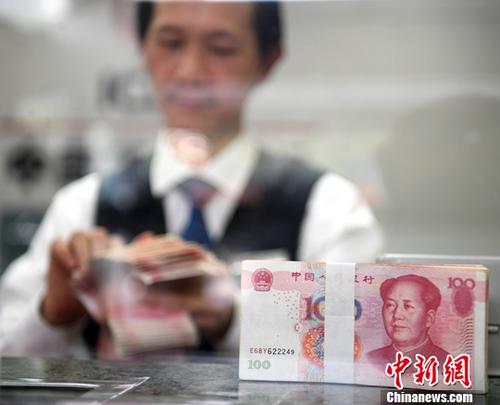(Economic Observer) What are the new formulations of China's fiscal and monetary policy in 2021?
China News Service, Beijing, December 19 (Liu Liang) The Central Economic Work Conference concluded in Beijing on the 18th.
The meeting pointed out that China will continue to implement a proactive fiscal policy and a prudent monetary policy next year.
But in terms of specific content, there are some differences from previous years.
Data map: RMB.
Photo by China News Agency reporter Yu Jing
Many people in the industry said in an interview with a reporter from China News Agency that the content of the Central Economic Work Conference shows that China’s macro economy will be more focused on "stability" and "quasi" in the coming period. The expression of fiscal policy emphasizes " More sustainable”; the expression of monetary policy emphasizes “flexible, precise, reasonable and appropriate”.
With the collaboration of the two, it is foreseeable that China's economic work will show more highlights next year.
Fiscal policy emphasizes "more sustainable"
The meeting pointed out that next year's macro policy should maintain continuity, stability and sustainability.
In terms of fiscal policy, a proactive fiscal policy should improve quality and efficiency, be more sustainable, and maintain a moderate spending intensity.
Liu Ying, a researcher at the Chongyang Institute of Finance of Renmin University of China, pointed out that compared with the past, this year’s fiscal policy emphasizes “more sustainable”. This change means that China’s economy will continue to maintain stable development in the future, and the macro policy will continue to Maintain a certain continuity.
With the improvement of China's epidemic situation and the gradual recovery of the economy, the withdrawal of some stimulating economic policies will also have a certain transition period.
Li Qilin, deputy director and chief economist of the Hongta Securities Research Institute, also said that "sustainability" also confirms the stability of the policy, which is why the meeting emphasized that the policy operation is "not a sharp turn".
He pointed out that as China's economy picks up, while maintaining a moderate spending intensity, fiscal policy will not shrink too tightly, and the possibility of a sharp drop in special debt is unlikely, but the deficit rate may be adjusted.
Chen Fengying, a researcher at the China Institute of Modern International Relations, emphasized that the key to "not making a sharp turn" is to grasp the "timeliness" and "time window" of policies.
The meeting also proposed to strengthen financial support for major national strategic tasks and take the initiative in promoting technological innovation.
In Chen Fengying's view, the emphasis on technological innovation in fiscal policy is because technological research and development is an urgent task nowadays. China urgently needs financial investment in technological innovation to achieve breakthroughs in key core technologies of “stuck necks” through “filling shortcomings”. Thereby further enhancing the security of the supply chain industry chain.
Monetary policy emphasizes "flexible and precise"
In terms of monetary policy, the meeting proposed that a prudent monetary policy should be flexible, precise, reasonable and appropriate, and maintain the growth rate of money supply and the scale of social financing to basically match the growth rate of the nominal economy.
Liu Ying pointed out that the transition from “flexible and moderate” to “flexible, precise, reasonable and moderate” means that the precise guiding role of market liquidity is emphasized. In order to help companies alleviate financing difficulties, it is expected that interest rates will fall to reduce Real economy financing costs.
Liu Ying believes that China's economy is expected to achieve relatively rapid growth next year, but at the same time, attention should be paid to keeping the money supply and the growth rate of social financing scale compatible with the economic growth rate, and the two should maintain a relative balance.
The meeting proposed to maintain the basic stability of the macro leverage ratio, properly handle the relationship between economic recovery and risk prevention, and maintain the basic stability of the RMB exchange rate at a reasonable and balanced level.
Chen Fengying said that maintaining leverage stability and preventing risks are particularly critical. Financial stability is the foundation of economic development and an important factor in maintaining sustainable development.
Qu Hongbin, chief economist of HSBC Greater China, believes that it will take time for China's consumption to recover and the manufacturing industry may start a new round of growth cycle. All of these require interest rates to maintain a more appropriate level.
Therefore, there is a high probability that next year's monetary policy will maintain the benchmark interest rate unchanged or maintain the current level.
(Finish)

